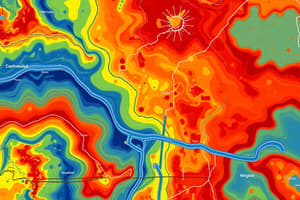Podcast
Questions and Answers
What is the study of climatic data called?
What is the study of climatic data called?
- Hydrology
- Mammalogy
- Meteorology
- Climatology (correct)
What does Ichthyology study?
What does Ichthyology study?
Fish
Which branch studies the relationship between insects and forests?
Which branch studies the relationship between insects and forests?
- Geology
- Ornithology
- Entomology (correct)
- Botany
Who developed the Theory of Relativity?
Who developed the Theory of Relativity?
What is the focus of Hydrogeology?
What is the focus of Hydrogeology?
Who discovered pasteurization?
Who discovered pasteurization?
What does Genetics study?
What does Genetics study?
What is Cosmology concerned with?
What is Cosmology concerned with?
What does Botany study?
What does Botany study?
Which branch of science deals with the study of fungi?
Which branch of science deals with the study of fungi?
Flashcards are hidden until you start studying
Study Notes
Climatology and Related Fields
- Climatology studies climatic data, changes, phenomena, and causes.
- Ichthyology focuses on the study of fish.
- Entomology examines insects' roles in forests and forest products.
Physical Sciences
- Physics investigates matter, energy, and their interactions, including gravity, light, and time.
- Notable physicist, Albert Einstein, is known for developing the Theory of Relativity.
- Chemistry analyzes the composition, properties, reactions, and structure of matter.
- Louis Pasteur invented pasteurization to eliminate harmful germs in liquids like milk.
- Hydrology studies water's distribution, occurrence, properties, and circulation on Earth, including bodies of water.
- Mineralogy looks into the chemical composition, crystal structures, and physical properties of minerals.
Life Sciences (Biology)
- Mammalogy focuses on the study of mammals.
- Protozoology delves into the study of protozoans.
- Ornithology studies birds.
- Genetics examines heredity, variation of organisms, and patterns of inheritance.
Earth Sciences
- Astronomy is the study of celestial bodies such as stars, comets, and planets, and their phenomena beyond Earth's atmosphere.
- Cosmology explores the universe's nature, origin, and structure.
- Geography studies Earth’s features, including climate, topography, vegetation, and soil.
- Geology involves the study of Earth's structure and processes.
Medical Sciences
- Seismology investigates earthquakes and Earth's structure, guided by the study of seismic waves.
- Medicine is dedicated to the maintenance and restoration of human health through diagnosis and non-surgical treatments.
- Cardiology specializes in heart disorders and their diagnosis and treatment.
- Dermatology addresses skin disorders like moles, skin cancers, and psoriasis.
Specialized Branches
- Botany is dedicated to the study of plants.
- Hydroponics cultivates plants in nutrient-rich water rather than soil.
- Mycology focuses on fungi and fungal infections.
- Dactylography involves using fingerprints for identification purposes.
Studying That Suits You
Use AI to generate personalized quizzes and flashcards to suit your learning preferences.




